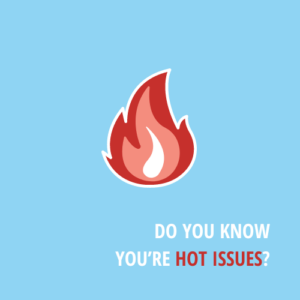Do you know your Hot Issues?
We all have our ‘psychological issues’ and they usually have heat around them – from mild heat to raging thunder. Our issues mess with our life. These are fears that we have formed from our background and lived experience. These are our vulnerable spots, our Achilles heels, that are just sitting there ready to be triggered.
Some common issues:
- We may have a fear of criticism from others because we have those critical thoughts ourselves or have grown up around criticism
- We may have a fear of losing our freedom because we have experienced being controlled.
- We might feel we have to know everything, be the expert, never say sorry, because we grew up without hearing that our loved ones were proud of us. Perhaps being wrong equates to feeling like we are worthless.
- Perhaps we are not used to our needs having importance.
- We may have an obsessive need for perfection because otherwise we believe we are a failure.
- We may blame ourselves for everything because we grew up in the shadows.
- .
- We may believe that it’s only a matter of time before everyone leaves us, because that has been our experience in life on some level or another.
We all have issues. We may have overcome them to a large degree, but we know they are sitting there in our background. And that is okay. This is the vulnerability of being human, and that is the complexity of us as creatures that need each other to form our self-concept and sense of security. The problem is just that we are so fallible, and we often screw up the self-caretaker role.
Our issues come from a melting pot of causes. They may come from our attachment difficulties, or a tendency in our personalities to take things to the extreme (as with perfectionism or catastrophising), or cultural pressures (for example, the success/beauty/image pressures in society).
The key is to know what your issues are. Just as we can list off our physical vulnerabilities, we need to be able to list off our psychological vulnerabilities. And just as we look after and even compensate for our physical vulnerabilities or work on strengthening, we need to do the same with our psychological ‘hot issues’. Only then can we be proactive in managing them, caring for them and not being ruled by them. We can understand that we are seeing our relationships through the lens of our issues, and then we can work to take these ‘issues’ glasses off and try to be more objective with our relationships and the situations we are in.
So, what are your issues? What are the themes that keep coming up for you in your relationships, in your negative self-talk, in your approach to life choices? What might you be projecting on to others? (Could it be You will leave me or You don’t want to know what I think or You will be critical of me?).
List your issues. Literally write them down. Get them out. And keep playing with your list.
Keep exploring until you are more of an expert on yourself. This is about being vulnerable. Having the strength and the courage to look at your fears, your weaknesses, your bruises. Many people get lost in the belief that it is best to show a strong façade to the world (and to themselves), but this is not real; it is fiction. The façade crumbles quickly because there is not a strong foundation. To be vulnerable and honest with your issues means being real – the actual authentic you. You need courage to find this scary and do it anyway. It means having the genuine strength to be psychologically naked with yourself. From this level of honesty, you can heal, process, spring clean, and strengthen as you become more rational with your history and your role in it. You can then respond with self-compassion. You are arming yourself for your life.
After we have tried to flesh out and know our issues, we then need to spend time working on them and healing. We create our own solution. We can begin to look at them with more analytical distance (check out my blog on ‘getting out of your head’), rather than thrashing about with them. Part of this process is defining our issues in words, which in itself will help to gain distance and release from them. Rather than being so focused on the limitations of people around us, we can also take this opportunity to get the ‘weeds’ out of our own ‘garden’ first.
It is very good news that whatever our early influences and struggles, we can, through the skill of mindfulness, recognise and validate our experiences and then methodically work through them. After observing and acknowledging our issues, our thoughts and our feelings, we need to skill up to work through them.
You will inevitably feel some resistance or resentment within yourself. This is our defensive wall, our reluctance to look squarely at our thoughts, emotions and behaviours. They are often not flattering. We can even feel self-conscious with ourselves when we are being honest with our issues. They can be confronting. This resistance in itself is information about loaded issues that we carry. It is important to know that resistance is very normal, and working through this level of our reactivity is especially releasing. We must learn from our past if we are to avoid repetitious mistakes and remain trapped in a continual merry-go-round of emotional pain. We have painful memories that need to be worked through; otherwise the pain remains, ferments and grows. Change is the essence of life. It is the goal of all psychotherapeutic conversation.
A commonly held notion is that our future is firmly shaped by our childhood experiences. But there is an ingredient missing here. Us! Our actions, our choices. We reshape ourselves. We are not responsible for what has shaped us, but we are accountable for what we do with it. We need to reject the assumption that even the most awful experiences control and define our lives forever. Our past is gone. We need to accept this reality and work through our past before we can move forward. We are working to feel more secure within ourselves and with others, to learn to be more open and present with our thoughts, feelings and emotions.
This is about strengthening. Through becoming healthier in ourselves we are also able to choose our responses rather than being reactive, and we can become more patient and empathetic with others. This is wisdom. This is the doorway to a healthy regard for yourself and improved relationships with others. For example, we may come to recognise that our experiences as a child are influencing how we are relating and communicating with our partner. This recognition allows us to become more aware of how we react. We can go from avoiding our fears to understanding and working with them. We can then feel more secure and much more connected to our loved ones. This kind of awareness helps us to see our dysfunctional reactions sooner and choose healthier ways of responding sooner. We are soothing the child-learned reactions; we are letting ourselves know that everything is going to be alright. In truth we are giving parental love and guidance to our child self, to dysfunctional reactions that we took on board when at the time we didn’t have any other choice.
Wish you well, take care.



Subscribe To Our Newsletter
Join our mailing list to receive Psych wisdom, advice and encouragement once a month.
"The Skills we need are not just common sense, we need to learn them from somewhere"
You have Successfully Subscribed!